Key takeaways:
- Escape rooms enhance problem-solving and communication skills while fostering teamwork and deeper relationships among participants.
- Choosing the right escape room theme and difficulty level significantly impacts the overall experience and enjoyment.
- Effective strategies for solving puzzles include dividing tasks, keeping detailed notes, and maintaining a relaxed attitude to maximize fun and efficiency.
- Avoiding common mistakes, such as not using all senses and being hesitant to ask for hints, is crucial for a successful escape room experience.
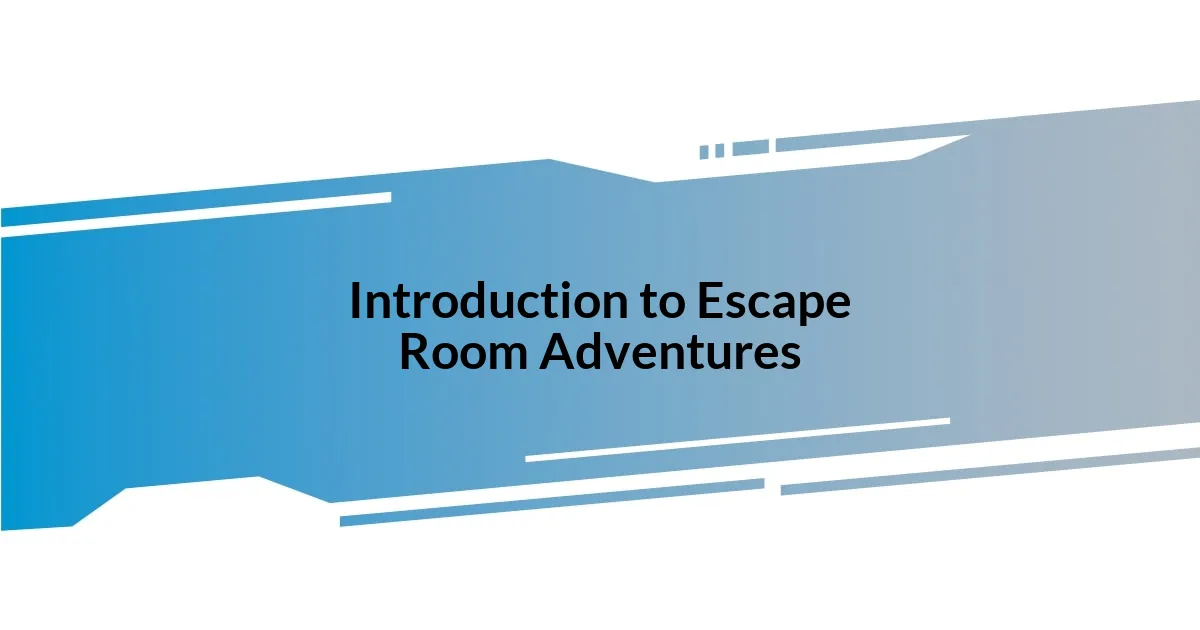
Introduction to Escape Room Adventures
Escape room adventures have become a popular choice for those seeking a fun and immersive experience. I still remember my first time stepping into one, excitement buzzing in my stomach. The thrill of being locked in a room and needing to solve puzzles within a set time frame was unlike anything I had ever experienced. Isn’t it exhilarating to think about racing against the clock with friends, working together to beat the odds?
These experiences not only test our problem-solving skills but also our ability to communicate under pressure. I’ve witnessed how this shared challenge can deepen bonds between friends and family; it’s like the ultimate team-building exercise wrapped in a game. Have you ever found yourself in a situation where you had to rely on others? An escape room magnifies that feeling, transforming it into an unforgettable adventure.
In many ways, escape rooms are a modern blend of storytelling and gameplay. Thematic elements draw you into a world of mystery, and you can’t help but feel invested in the outcome. It’s fascinating how a few cleverly crafted clues can evoke such a rush of adrenaline. Every locked door and hidden key beckons you to explore deeper, leaving you eager for the next twist in the narrative. How do these carefully designed experiences capture our imaginations so completely?
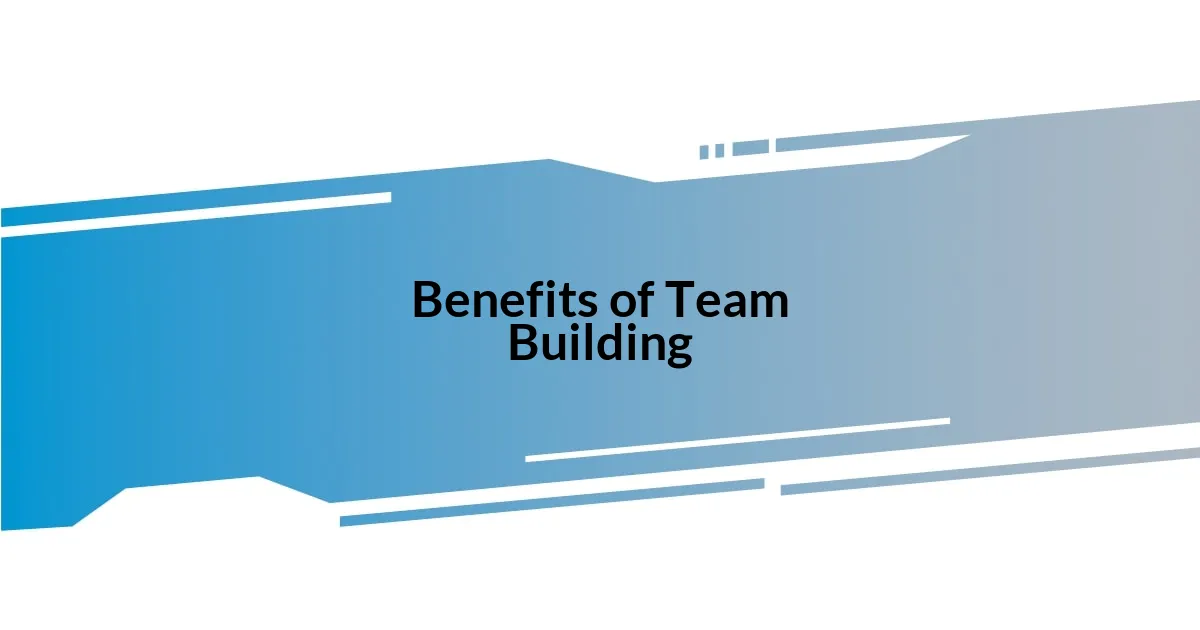
Benefits of Team Building
Working together in an escape room isn’t just about solving puzzles; it’s an incredible chance to strengthen team dynamics. I’ve often seen how differing perspectives come together, shining a light on individual strengths. For instance, one of my friends, usually quiet, suddenly found his voice when he discovered a clue that required quick math. This moment wasn’t just about the puzzle – it highlighted his unique ability to think quickly under pressure and bolstered his confidence.
As we navigated through brain-teasing challenges, I noticed my group’s communication skills flourish. Each time one of us arrived at a solution, it fostered an atmosphere of collaboration. I remember the moment when someone suggested an idea that initially seemed ludicrous, yet it sparked the breakthrough we needed. That experience reminded me of how important it is to create a space where everyone feels comfortable contributing.
Moreover, the intense time constraints of an escape room serve to heighten camaraderie. The thrill of racing against the clock creates an exhilarating bond. When we finally escape, the resulting sense of achievement is palpable and lasting, leaving everyone feeling united and accomplished. In my experience, it’s these shared victories that transform acquaintances into lifelong friends.
| Benefits of Team Building | Examples from Escape Room Adventures |
|---|---|
| Improved Communication | Participants learn to share ideas and solutions effectively. |
| Enhanced Problem-Solving Skills | Diverse perspectives lead to innovative approaches in solving puzzles. |
| Strengthened Relationships | Success in challenges fosters connections and shared memories. |
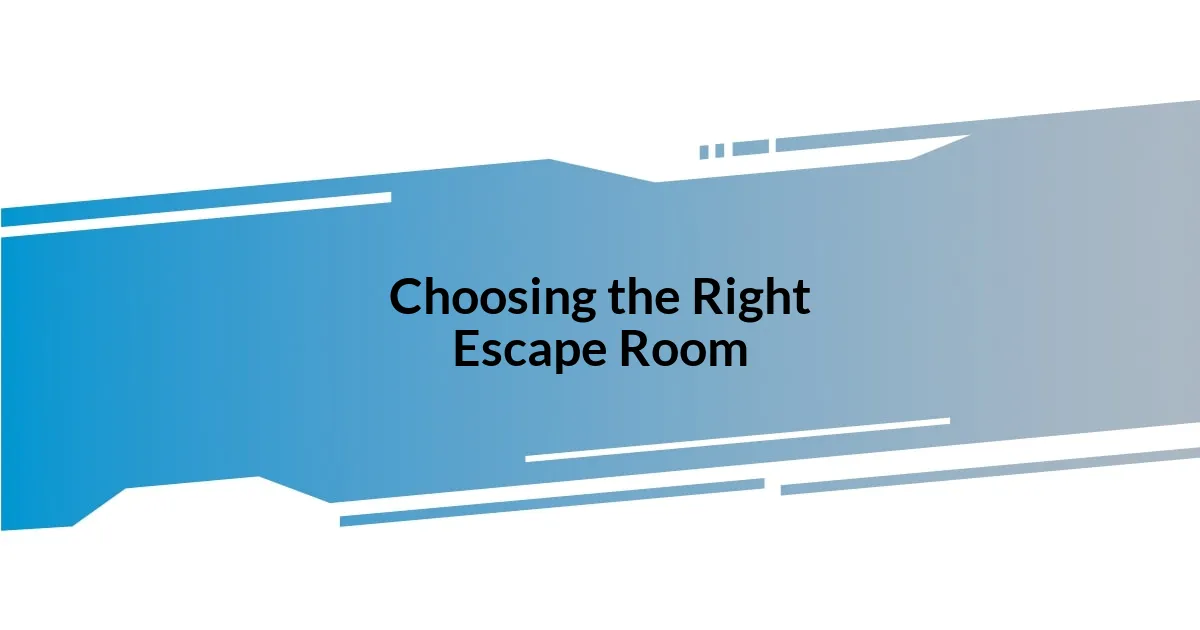
Choosing the Right Escape Room
Choosing the right escape room can vastly change your experience. I always recommend considering the themes that resonate with you and your group. For example, a horror theme can send chills down your spine, while a mystery theme can engage your love for storytelling.
Here are a few factors to keep in mind when selecting an escape room:
- Group Size: Ensure the room can comfortably accommodate your party. Small rooms can make teamwork tough, while larger spaces may dilute the experience.
- Difficulty Level: Assess your team’s experience. Do you prefer a brain-buster or something more relaxed?
- Theme Appeal: Choose a theme that excites everyone. Whether it’s a classic detective mystery or a sci-fi adventure, enthusiasm will enhance your performance.
- Reviews and Recommendations: Check online reviews or ask friends for suggestions. Insight from others can guide you toward a quality experience.
Once, my friends and I opted for a time-travel-themed room. The excitement was palpable, but we quickly realized we were out of our depth with some tricky puzzles. By the end, we’d laughed through our missteps and celebrated our small victories. I learned that sometimes the best memories come from the challenges, not just the success.
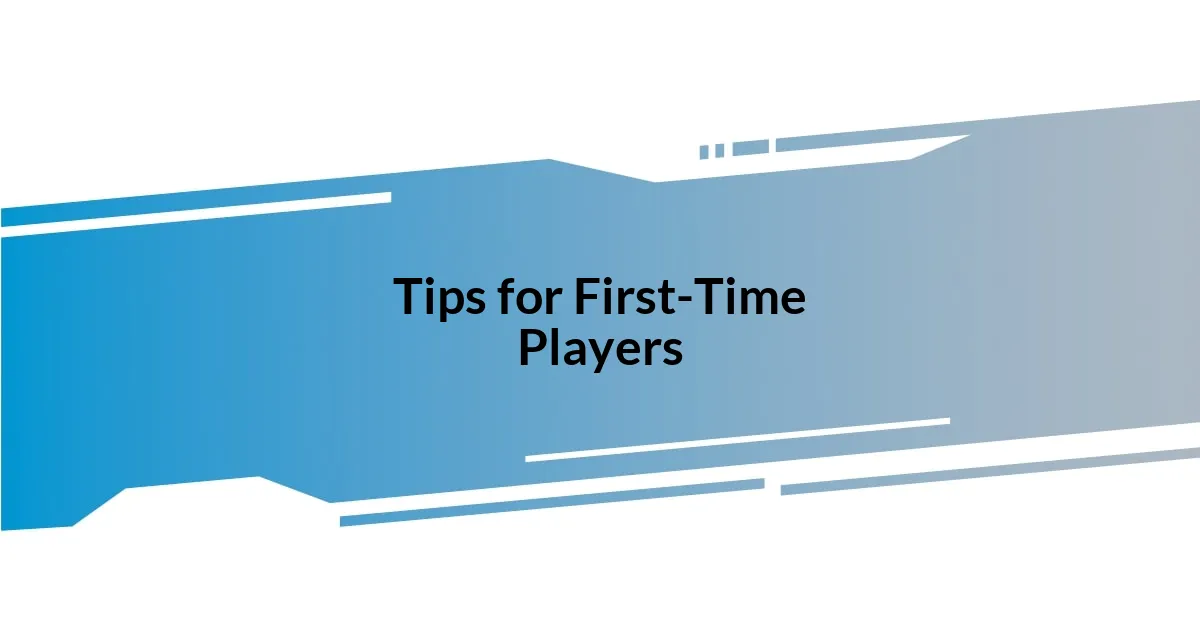
Tips for First-Time Players
As a first-time player, getting familiar with the escape room setting can make a huge difference in how you experience it. From my first adventure, I learned it’s crucial to communicate openly with your teammates. I remember how one of my friends kept saying, “I’ve got an idea!” but didn’t share it until several minutes had passed. Imagine if he’d spoken up sooner; we might have unlocked that riddle much faster!
It’s also important not to hesitate when diving into puzzles. I once second-guessed myself on a simple code only to see someone else get the clue right. I wish I’d just trusted my instincts a bit more. So, when you’re faced with a challenge, trust your gut and share your thoughts! You never know how a small suggestion could spark a breakthrough for the whole team.
Lastly, remember to maintain a relaxed attitude. I once saw a team get so wrapped up in winning that they forgot to enjoy the experience. I recall how stress filled the room when the timer was ticking down. In contrast, when I approached my next room with a lighter mindset, the laughter and camaraderie just flowed. After all, it’s about having fun together, right? Celebrating all the little victories along the way truly enhances the overall experience.
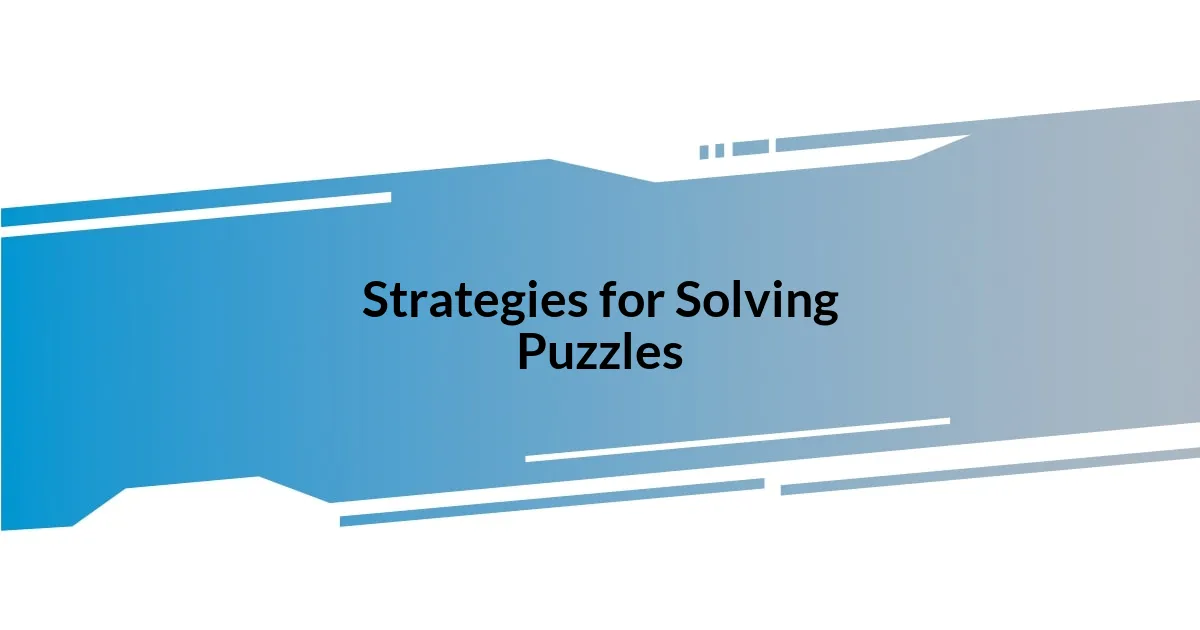
Strategies for Solving Puzzles
When it comes to solving puzzles, one strategy I’ve found particularly effective is dividing and conquering. I remember a scenario where my team split into pairs to tackle different clues simultaneously. This approach not only maximized our efficiency but also sparked lively discussions on what each pair discovered. Have you ever noticed how sharing insights can lead to those “aha!” moments? It’s like pieces of a puzzle quickly clicking together, and it makes the adventure much more engaging.
Another technique involves keeping detailed notes. I can’t stress enough how jotting down observations and ideas has transformed my gameplay. In one escape room, I started creating a mini blueprint of the clues we uncovered. This visual representation helped me connect dots I otherwise might have missed. Think of it as your own personal treasure map leading to the ultimate goal of escaping. Have you tried something similar? You’d be amazed at how often a simple note can pave the way for breakthrough insights.
Lastly, sometimes the simplest solutions are the most overlooked. I remember one particularly challenging room where, after minutes of feeling stuck, I took a step back and reevaluated what was right in front of me. A seemingly insignificant detail, such as the color of a lock or the arrangement of objects, turned out to be crucial. When was the last time you paused to reconsider the obvious? This shift in perspective often reveals hidden clues, making the experience even more thrilling as you realize that the answers were there all along, just waiting to be discovered.
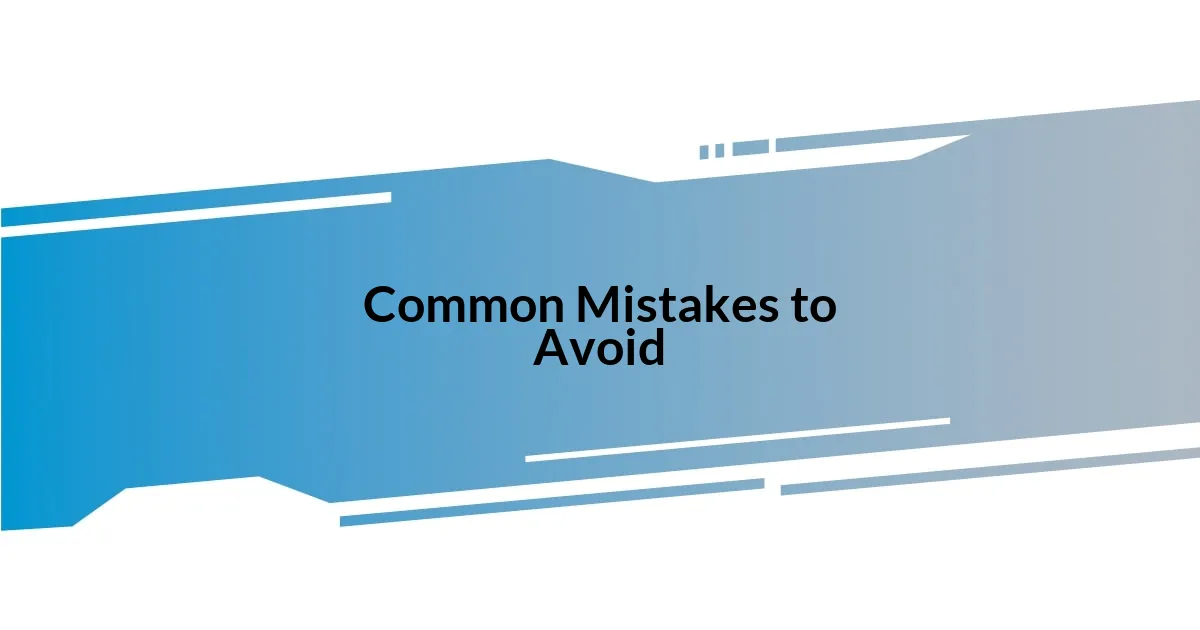
Common Mistakes to Avoid
One common mistake I’ve seen players make is not using all their senses. I recall a moment in a dimly lit room where a team was focused solely on searching through drawers and shelves. Meanwhile, there was a subtle hint on the wall that could have easily been missed. Sometimes, the most obvious clues are hidden in plain sight. Have you ever overlooked something right under your nose? Paying attention to your surroundings can vastly change the outcome of your escape.
Another pitfall is assuming every clue is directly tied to another. I vividly remember getting fixated on one puzzle during a particularly tricky game, thinking if I could just solve it, everything else would fall into place. Frustration set in, and the team’s dynamic started shifting. In retrospect, I realized that taking a step back and re-evaluating our progress could have kept the momentum going. It’s vital to stay flexible and open to the idea that some clues might lead to dead ends.
Lastly, don’t be afraid to ask for hints when you’re truly stuck. During one of my earlier encounters, my pride got the better of me. I watched the clock tick down, feeling embarrassed to call for help. In hindsight, reaching out could have salvaged the game for us. What’s the harm in asking for guidance? Being proactive about getting a hint can actually enhance the experience and allow the team to keep moving forward. Remember, the goal is to escape – and sometimes, it takes a little nudge to get there!
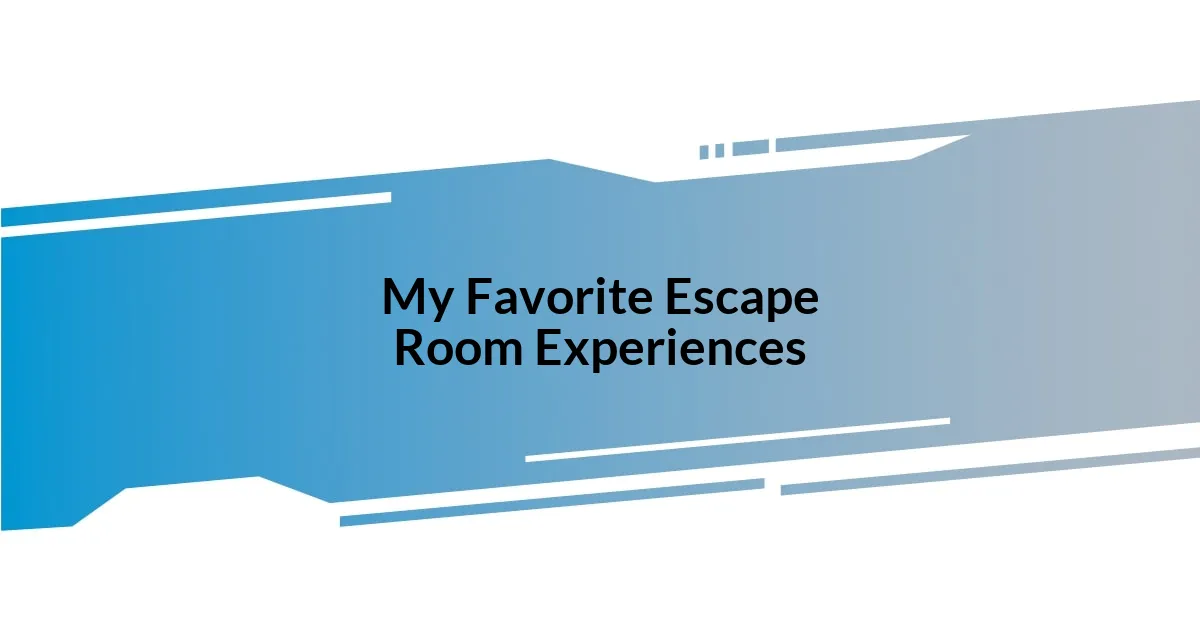
My Favorite Escape Room Experiences
I have to say, one of my favorite escape room experiences was in a haunted house-themed room. The atmosphere was so immersive that I genuinely felt a rush of adrenaline when the lights flickered. It’s incredible how a dark room filled with eerie sounds can heighten the tension and excitement. Have you ever been in a situation where the setting just pulls you in? That particular escape room challenged us not just mentally but emotionally as well, making every solved puzzle feel like a small victory.
Another experience that stands out to me involved a spy-themed escape. The puzzles were all about codes and secret compartments, which really played into my love for mystery stories. I vividly remember the moment we cracked a cipher—my heart raced, and we all cheered as if we had just won the championship of escape rooms. It’s remarkable how these moments foster such a strong bond between team members. Have you ever felt that surge of camaraderie when achieving something together? That shared joy made the success even sweeter for us.
Then there was the time I entered an escape room that revolved around solving a murder mystery. We had to piece together clues to uncover the story behind the crime. I’ll never forget the excitement when we discovered a hidden drawer in a desk with key evidence inside. It felt like our team was taking on the role of detectives, engaged in a thrilling story. I can’t help but ask, can you remember a time when figuring something out made you feel like a hero in your own adventure? Moments like these are why I keep coming back to escape rooms—where every clue feels like a step toward an exciting resolution.